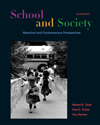 |  School and Society: Historical and Contemporary Perspectives, 4/e Stephen E. Tozer,
The University of Illinois, Chicago
Paul C. Violas
Guy Senese,
Northern Arizona University
National School Reform: The Early Cold War Era
Learning ObjectivesAmong the objectives that Chapter 8 seeks to achieve are these:
| The chapter should deepen and extend students' ability to think critically about the presuppositions underlying the structure and content of modern schooling, particularly at the secondary level. |
 |  |  | | Students should critically examine how modern liberal commitments to such values as expert knowledge, meritocracy, and nationalism have influenced schooling in the latter half of the twentieth century. |
 |  |  | | They should also engage in thinking critically about the school as an instrument of national political policy in the political-economic context of the United States after World War II. |
 |  |  | | Students should question the notion of a nationalist agenda for schooling within the context of democratic ideals, in that the idea of "national interest" can itself become problematic. Who, for example, legitimately determines what the "national interest" is in a democracy? How does the student's answer to that question compare with the historical record of the Conant era of reform? |
 |  |  | | Students should consider how a relatively recent historical instance of an expressed commitment to democracy and equality could, in modern liberal schooling policy, serve students inequitably. |
 |  |  | | Students should also consider Van Doren's alternative approach to democratic education in contemporary society, one that is committed not to social or political outcomes, but to an ideal of human development applicable to all students. |
 |  |  | | The chapter can thereby help students challenge their own tendency to believe that the dominant way of thinking about school and society in a particular era was the only "sensible" approach, or that it was a necessary "product of the times" and therefore a consensus view. |
|



 2002 McGraw-Hill Higher Education
2002 McGraw-Hill Higher Education